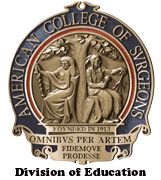Super-Extended Lymphadenectomy (D4) in the Treatment of Gastric Cancer
I.M. Civello MD FACS; G. Brisinda MD; F. Brandara MD; I. Biondi MD

| Product Details | |
| Product ID: | ACS-2412 |
| Year Produced: | 2005 |
| Length: | 8 min. |
In the treatment of gastric cancer, surgical approach is conditioned by the extension of the disease and the presence of metastases. Extended lymph-node dissection (D2) has been generally accepted as a standard treatment modality. However, the role of the super-extended lymphadenectomy (D4) for gastric cancer has not been established. We present a case of a 49 year-old male with epigastric pain for over two months associated with weight loss. Physical examination revealed a benign abdominal picture. Esophagogastroduodenoscopy disclosed an ulcerative tumor (2 cm diameter) of the lesser curve. Microscopic examination of gastric biopsy specimens revealed a picture of poorly differentiated gastric carcinoma, diffuse type of the Lauren classification. A CT scan of the abdomen showed no signs of cancer.
Intraoperatively, we found a depressed area on the lesser curve of the stomach. Thus, we performed a total gastrectomy associated with D4 lymphadenectomy. The D4 dissection included lymph-nodes along the stomach as well as nodes along the celiac, splenic and hepatic arteries plus nodes along the porta hepatis and along the aorta and vena cava as far as down the inferior mesenteric artery. Microscopic examination of all resected nodes documented an infiltration of one node of the lesser curve and one along the splenic artery.
The post-operative course was uneventful. After seven days from surgery, the radiologic control demonstrated the absence of anastomotic leak.
After follow-up period of 2 years and a chemotherapuetic treatment (ECF scheme: epirubicin hydrochloride, cyclophosphamide, 5-fluorouracil) for six months, the patient is alive with no signs of recurrence. On the basis of our experience, D4 lymphadenectomy might be of therapeutic value for patients with gastric cancer.



